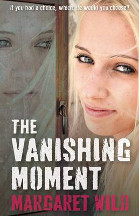The vanishing moment by Margaret Wild

Allen and Unwin, 2013. ISBN 9781743315903.
(Age 14+) Highly recommended. Adolescent. Mystery. Supernatural.
Arrow is still haunted by a childhood tragedy that has left her
mother overprotective and Arrow apathetic about her future. Marika
is a talented young artist making sculptures and attending
university, and whose life is turned into a nightmare after one
moment of inattention. Both are at a cross-road in their lives. What
would happen if they could live a different version of their lives?
Who would it affect?
Wild takes us on a journey of three lives in three narratives,
commencing with Bob whose live is so appalling that as a reader I
was left breathless with the abuse both physical and mental that was
dealt out to him by his stepfather. Arrow's story then follows. She
is a sleepwalker, whose habit nearly leads her into danger, only to
be rescued by her neighbour out walking his dog. She is indifferent
to life, sleeps until midday and has not kept in touch with her
friends. She thinks often of her childhood friends and what would
have happened if she had reported that they were left alone at
night. Marika makes intense sculptures, but also looks after her
young brother Jasper and promises not to let go of his hand.
Terrible circumstances bring all three together when they meet at
Shelley Beach and Arrow is told of the Interchange that she could
have accepted to right the terrible wrong that had happened to the
friends that she had loved. Bob has used the Interchange but Marika
and Arrow must make a decision about it.
After some heart wrenching twists one group of people is finally
happy at the expense of the other. Then Wild adds a last chapter
showing what would have happened if Arrow had accepted the
Interchange when it was offered to her as a child and how each of
the different characters that the reader had met would have
prospered or suffered.
This is a novel that begs for a second, closer read to follow up the
literary references, to Borges' story The garden of forking
paths and Gwen Harwood's poem The twins, and the
questions of ethical choice. Would Arrow cause more harm by giving
money to a beggar who might spend it on alcohol, or would she be
helping him? It should garner much interesting discussion and would
be an ideal literature circle book or class set.
Pat Pledger